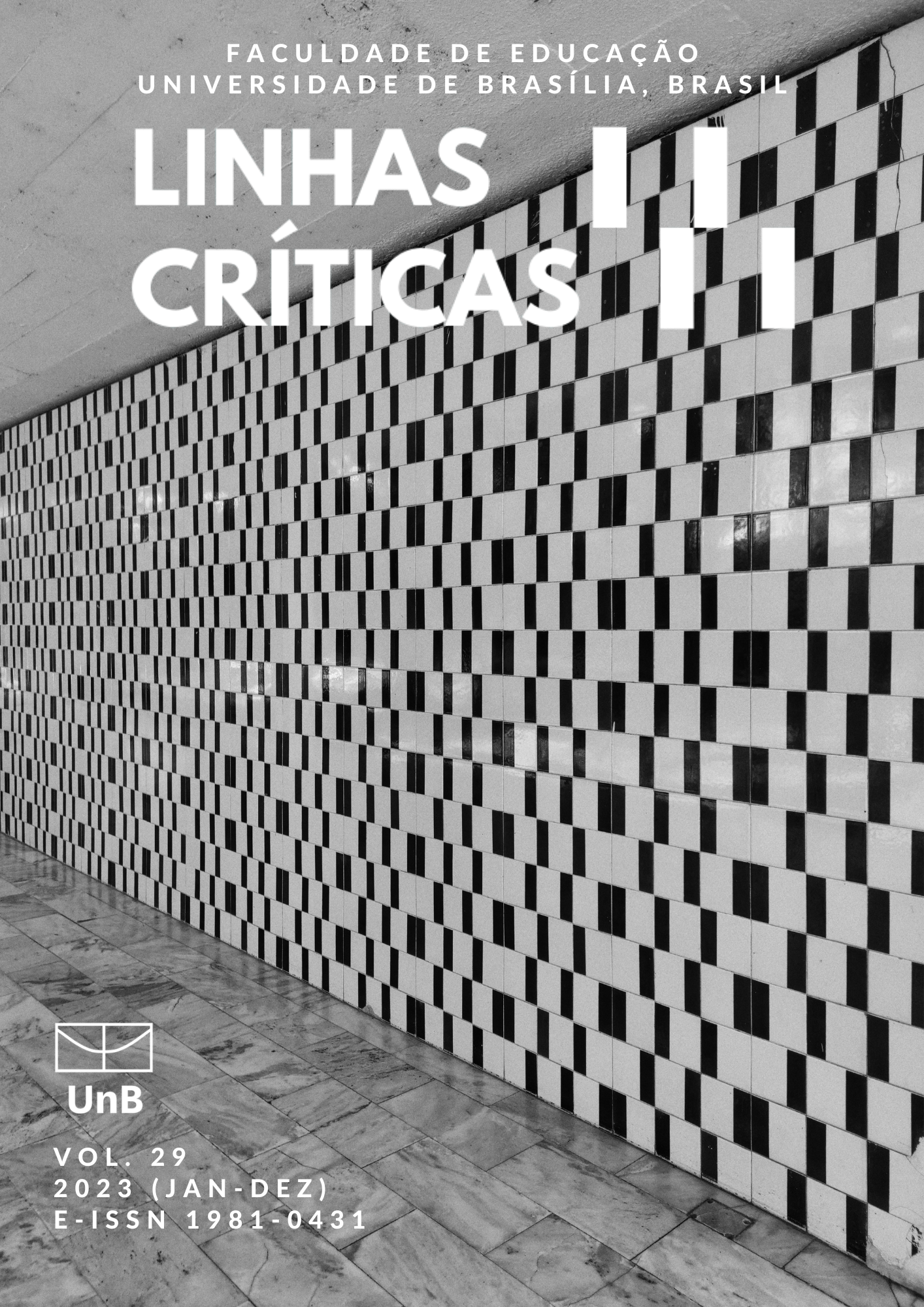Constitutionalization of permanent FUNDEB: Which actors were involved in policy formulation?
DOI:
https://doi.org/10.26512/lc29202346057Keywords:
Political actors, Policies, Cognitive policy analysis, FUNDEBAbstract
The article discusses the actors who were involved in the creation of the new FUNDEB. The minutes and tabular notes from the meetings and hearings of the Special Committees of the House of Deputies, which were established to discuss the proposed Constitutional Amendment No. 15 of 2015 (Brasil, 2015) in the 55th and 56th Legislative Sessions, were examined. The theoretical contribution that was used was a cognitive analysis of public policy. It was noted that there was a strong emphasis on the involvement of academic and professional communities in the 55th Legislative, but the participation of politicians who were institutionally authorized to make decisions prevailed in the 56th.
Downloads
References
Alves, T., & Pinto, J. M. R. (2020) As Múltiplas Realidades Educacionais dos Municípios no Contexto do Fundeb. FINEDUCA – Revista de financiamento da Educação, 10(23). http://doi.org/10.22491/fineduca-2236-5907-v10-104091
Brasil. (1934). Constituição da República dos Estados Unidos do Brasil. Congresso Nacional. http://www.planalto.gov.br/ccivil_03/constituicao/constituicao34.htm
Brasil. (1988). Constituição da República Federativa do Brasil. Congresso Nacional do Brasil. Assembleia Nacional Constituinte. http://www.planalto.gov.br/ccivil_03/constituicao/constituicao.htm
Brasil. (1996). Emenda Constitucional n.º 14, de 12 de setembro de 1996 (Modifica os arts. 34, 208, 211 e 212 da Constituição Federal e dá nova redação ao art. 60 do Ato das Disposições constitucionais transitórias.). https://www.planalto.gov.br/ccivil_03/constituicao/emendas/emc/emc14.htm
Brasil. (1999). Proposta de Emenda à Constituição n.º 112 de 1999 (Modifica os arts. 208, 211 e 212 da Constituição Federal e o art. 60 do Ato das Disposições Constitucionais). Câmara dos deputados. https://www.camara.leg.br/propostas-legislativas/14399
Brasil. (2006). Emenda Constitucional n.º 53, de 19 de dezembro de 2006 (Dá nova redação aos arts. 7º, 23, 30, 206, 208, 211 e 212 da Constituição Federal e ao art. 60 do Ato das Disposições Constitucionais Transitórias). Congresso Nacional. https://www.planalto.gov.br/ccivil_03/constituicao/Emendas/Emc/emc53.htm
Brasil. (2007). Lei n.º 11.494, de 20 de junho de 2007 (Regulamenta o FUNDEB, de que trata o art. 60 do Ato das Disposições Constitucionais Transitórias). http://www.planalto.gov.br/ccivil_03/_ato2007-2010/2007/lei/l11494.htm
Brasil. (2019). PEC 015/15 - Torna permanente o FUNDEB / educação. 55° legislatura da Câmara dos Deputados. [notas taquigráficas das reuniões e audiências]. https://www2.camara.leg.br/atividade-legislativa/comissoes/comissoes-temporarias/especiais/55a-legislatura/pec-015-15-torna-permanente-o-fundeb-educacao
Brasil. (2020). PEC 015/15 – FUNDEB. 56° legislatura da Câmara dos Deputados. [notas taquigráficas das reuniões e audiências]. https://www2.camara.leg.br/atividade-legislativa/comissoes/comissoes-temporarias/especiais/56a-legislatura/pec-015-15-fundeb
Brasil. (2015). Proposta de Emenda à Constituição n.º 15 de 2015 (Torna o Fundeb instrumento permanente de financiamento da educação básica pública). Câmara dos Deputados. https://www.camara.leg.br/proposicoesWeb/fichadetramitacao?idProposicao=1198512
Brasil. (2020). Emenda Constituição n.º 108, de 26 de agosto de 2020 (Altera a Constituição Federal para estabelecer critérios de distribuição da cota municipal do ICMS). Congresso Nacional. https://www.planalto.gov.br/ccivil_03/constituicao/emendas/emc/emc108.htm
Capella, A. C. N. (2015). Análise de Políticas Públicas: da técnica às ideias. Revista Agenda Política, 3(2), 239-258. https://www.agendapolitica.ufscar.br/index.php/agendapolitica/article/download/75/71
Cruz, G., & Rocha, R. (2018). Efeitos do FUNDEF/B sobre frequência escolar, fluxo escolar e trabalho infantil: uma análise com base nos Censos de 2000 e 2010. Estudos Econômicos, 48(1), 39-75. https://doi.org/10.1590/0101-4161481239gcr
Davies, N. (2006). FUNDEB: a redenção da educação básica? Educação e Sociedade, 27(96), 753-774. https://doi.org/10.1590/S0101-73302006000300007
Freeman, R. (1984). Strategic management: a stakeholder approach. Sage.
Gluz, M. P. (2019). PEC 015/2015: criação do FUNDEB permanente. [Dissertação de mestrado, Universidade Federal do Rio Grande do Sul]. Lume. https://lume.ufrgs.br/handle/10183/199243
Gouveia, A., & Souza, Â. (2015). A política de fundos em perspectiva histórica: mudanças de concepção da política na transição Fundef e Fundeb. Em Aberto, 28(93). https://doi.org/10.24109/2176-6673.emaberto.28i93.2457
Jones, B. D., & Baumgartner, F. R. (2005). A model of choice for public policy. Journal of Public Administration Research and Theory, 15(3), 325-351. https://doi.org/10.1093/jopart/mui018.
Mendes, D. C. B. (2012). FUNDEB: avanços e limites no financiamento da educação básica no Brasil. Revista Eletrônica de Educação, 6(2), 392-412. https://doi.org/10.14244/19827199464
Militão, S. C. N. (2011). FUNDEB: mais do mesmo? Nuances: estudos sobre Educação, 18(19), 124-135. https://doi.org/10.14572/nuances.v18i19.351
Muller, P., & Surel, Y. (2002). A análise de políticas públicas. EDUCAT.
Oliveira, R. F. (2009). Do FUNDEF ao FUNDEB: O processo político de formulação da Emenda Constitucional n.º 53/2006. Jornal de Políticas Educacionais, 3(5). http://doi.org/10.5380/jpe.v3i5.17352
Sabatier, P. A., & Jenkins-Smith, H. (1993). Policy Change and Learning: an advocacy coalition approach. Westview Press.
Secchi, L. (2014). Políticas Públicas: conceitos, esquemas de análise, casos práticos (2. Ed.). Cengage Learning.
Semeghini, U. C. (2001). Fundef: corrigindo distorções históricas. Em Aberto, 18(74). https://doi.org/10.24109/2176-6673.emaberto.18i74.2152
Soares, S. A., & Vitelli, M. G. (2016). Comunidades epistêmicas e de prática em defesa na Argentina e no Brasil: entre a organicidade e a plasticidade. Carta Internacional, 11(3), 99-123. https://doi.org/10.21530/ci.v11n3.2016.510
Published
How to Cite
Issue
Section
License
Copyright (c) 2023 Glecenir Vaz Teixeira, Franceline Rodrigues Silva, Josielli Teixeira de Paula Costa, Daniel Santos Braga

This work is licensed under a Creative Commons Attribution 4.0 International License.
Authors who publish in this journal agree to the following terms:
-Authors maintains the copyright and grants the journal the right of first publication, the work being simultaneously licensed under the Creative Commons Attribution License which allows the sharing of the work with recognition of the authorship of the work and initial publication in this journal.
- Authors are authorized to enter into additional contracts separately, for non-exclusive distribution of the version of the work published in this journal (eg publish in institutional repository or as a book chapter), with acknowledgment of authorship and initial publication in this journal.
-Authorers are allowed and encouraged to publish and distribute their work online (eg in institutional repositories or on their personal page) at any point before or during the editorial process, as this can generate productive changes as well as increase the impact and the citation of published work (See The Effect of Free Access).



